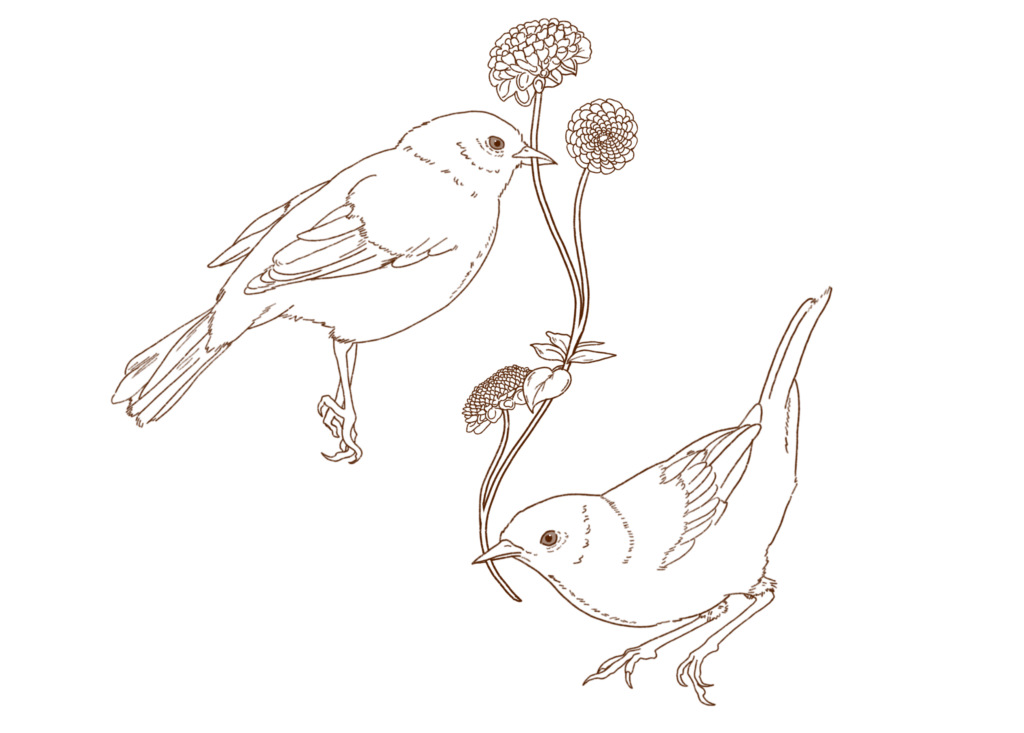
March 8, 2023 | Story by Michelle Holder | Illustration by Delia Sauer | Photos courtesy of Michelle Holder
Every morning, my Oma fed the birds.
She spread Pindakaas, a thick Dutch peanut butter, on old, crusty bakery bread and set the slices on a splintered wooden birdhouse. I watched the birds feast on the food throughout the day, and soon enough, the slices would be mere crumbles.
In high school world history class, I learned about Europe’s past of kings, queens, conquests and castles. The words of Charlemagne, the former King of the Franks, spoke to me: “To have another language is to possess another soul.”
As a Dutch-American, my tongue knew the hard “G’s” of Dutch and the strong “Th’s” of English. I straddled two homes: the Dutch countryside where I spent my childhood summers biking, and the rough Floridian turf where I spent days running on beaches and swimming in the ocean.
But the house on Bakersweg 49 will always hold a piece of my heart.
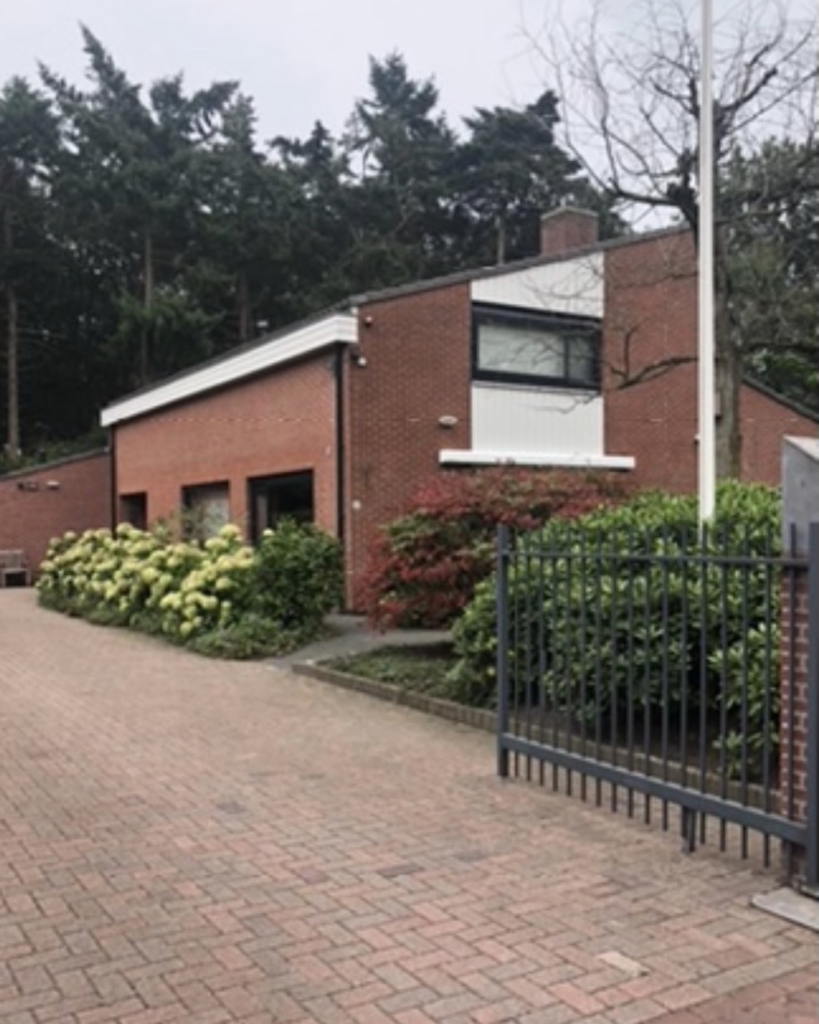
My Dutch grandparents’ home was a magical place. An hour outside of Amsterdam, in a small village called Voorthuizen, my Oma and Opa lived surrounded by farmland and cattle ranches.
The front gate and the cobblestone driveway led to the facade of the brick house. White dahlias sprung from the groomed garden near the doorway, their spherical blooms sprouting with beauty. The house’s interior centered around an old fireplace. My Oma camped in the living room reading a magazine with a coffee in hand while the sun shone through the expansive windows. My Opa sat in his office watching the Tour de France or reading a thick mass-market paperback novel.
My sister, brother and I shared one room, which was my uncle’s childhood bedroom. My uncle is a sailor now, and his room fittingly displayed miniature boat models and photographs of the sea. When we weren’t coloring, drawing or playing with Legos in the room, you’d find us in the garden: a grand, green oasis that is still the quiet paradise of my mind.
Green hedges surrounded the sanctuary, and flower bushes decorated the ground. Mossy grass blanketed the earth beneath my feet, and a short tree with a canopy of wide branches sat in the middle. My grandparents’ dog, Donja, often slept under its leaves.
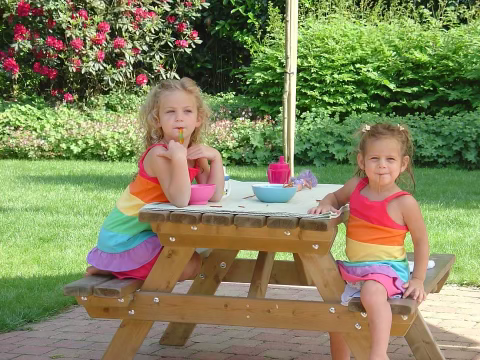
Holder and her younger sister Juliette loved to play together. After riding bikes or playing fetch with the dog, Holder and her sister sat at a picnic table to eat a snack.
Outside, my siblings and I explored the garden, collecting rocks and picking flowers. We played pretend and we played house. We biked on the paved porch while my parents ate cheese and drank red wine at the outdoor table.
On the first day at the house each summer, we always ate Dutch pannenkoeken. It is our family tradition. My Oma cooked the pancakes with two pans in hand, flipped them onto plates and coated them in powdered sugar and butter.
Every day, my grandparents took Donja on a walk into the “bos,” which was the vast forest near the house. We wore big boots and hunting hats to trek into the woods. I remember going with my Opa often, and on our long walks, he sang Dutch songs to me.
One day when I was playing in the yard, I came across a dead bird. It had flown into the closed window and snapped its neck. I grabbed my Opa, who came outside to see.
“Nou zeg, arme vogel,” he said. Poor bird.
He grabbed a handkerchief and carefully picked up the animal, wrapping it in the soft, white fabric. I watched as he grabbed a small shovel from the shed and started digging a hole near the flower bed. I watched him gently set the bird down and bury it. We walked together back inside.
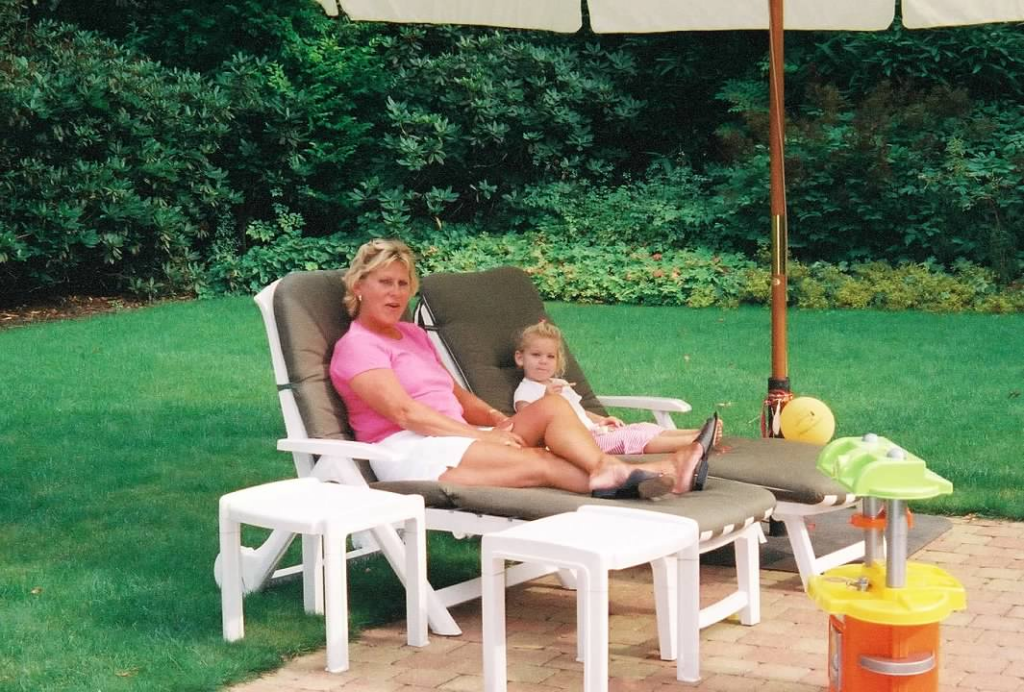
Holder would always follow her Oma around the house, from making traditional Dutch foods like pannenkoeken (pancakes) and heering (pickled fish) to laying out on the garden’s sun chairs.
As I grew, I spent fewer summers overseas with my grandparents. My life was now in Florida, enduring the heat of summers in the land of never-ending beaches. Softball tournaments, summer camps and other adventures occupied my time. The longer I was away from Holland, the more my Dutch language skills faded. No amount of Duolingo could bring them back.
Years passed, and I only went to Holland with my family occasionally. What once was every summer turned into once every three or four years. With my Dutch escaping, it was harder to communicate with my grandparents. They tried to speak in broken English, while I tried to remember my Dutch.
I lost my Dutch soul. Without the language and without living there, I felt foreign in my own home.
What would it have been like to grow up completely Dutch — riding my bike to school, playing soccer instead of softball, speaking Dutch instead of English? Would I enjoy the same hobbies? Who would my friends be? Would I be the same person I am today?
I want to experience what it means to be Dutch by living in the country, by speaking the language, by having friends there. Maybe one day I will. And when I do, maybe my Dutch soul will be resuscitated.
As the years passed, my grandparents aged. The house was too big. It was too hard to maintain.
The house on Bakersweg 49 sold in the spring of 2019. My grandparents moved to a smaller apartment across the village. While they kept the same art and the same sofa and the same TV that my Opa watches soccer matches on, all that’s left of the garden is a potted plant.
When I close my eyes, I remember the old house. I smell the white dahlias that greeted me when I opened the door. All the memories, laughs and love wrapped up in those brick walls. Even though my Dutch “G’s” have gotten harder to pronounce, the bond between my grandparents and me transcends a language barrier.
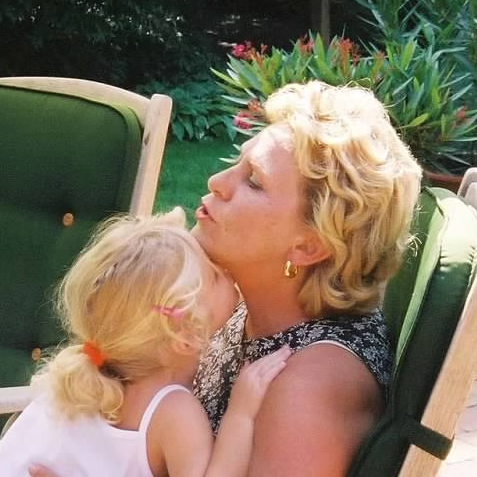
And even though the house is gone, I hope the next little girl to grow up there will spend time watching the birds.